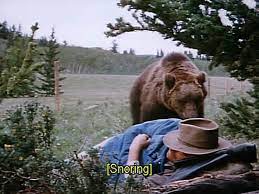You know, I’d watch this movie pretty regularly, if there were any way to do so; it’s almost enough to make me wish I’d bought the DVD instead of renting it. But it’s one of those Disney movies that’s just not something people can in general get their hands on. At least not with the ease we’re accustomed to in this day and age. I’m also generally surprised when something like this didn’t regularly crop on on The Disney Channel when I was a kid, but I didn’t see it there, either. There are a couple of moments when I was afraid we were going bad places, and we didn’t. So once again, we’re failing the Castaway Cowboy test.
We start with a bear family. Mother and two cubs, wandering around, vibing, doing their bear thing. Playing around—there’s a bear sledding scene that’s absolutely adorable. And then Man Is In The Forest. Specifically a couple of probably-Civil War veterans, Moki (John Yesno) and his former commanding officer Colonel Pierson (Chris Wiggins). The Colonel is starting up a ranch that will eventually be so large our laconic narrator (good ol’ Winston Hibler) comes to refer to it as an empire. It will have cattle, and cattle don’t get along with bears. Our Hero Bear’s mother fights a bull and kills it in an exquisitely Elizabethan moment, and the Colonel kills her and Wahb’s sibling. He shoots at Wahb, who falls off a cliff into a river.
Naturally, the bear survives, and the rest of the picture is basically the life of the bear and how Moki, who is explicitly Cree and of the Bear Clan, deals with the conflict between being a cattleman and being, you know, a Cree and of the Bear Clan. Some of how the Colonel treats him is really awkward, because it’s pretty clear that he has both forgotten that Moki is a Cree and believes that the Native Americans are primitives who need to grow up and be, essentially, white.
It’s also clear, at least to me, that Moki has internalized a certain amount of that. He talks about how much it matters to him—well, the narrator mostly tells us he thinks about how much it matters to him—that his grandfather taught him Cree beliefs about the bear. (Are they nonsense? I don’t know enough Cree beliefs to know.) But he also thinks it’s something he has to leave behind until he has a moment where he believes there’s something of an objective connection between him and Wahb, and that may or may not make his beliefs true but means that he’s going to act as though they are.
Yeah, okay, the Native American character is the one with the deep spiritual belief that keeps him from killing the bear. I get that. And we never do really talk about how the bear—and the wolves Maki kills midway through—were there first and are kind of an important part of the ecosystem in the areas without the cattle, cattle not being particularly suited to alpine forests. So while I’m sure there are people who consider this movie Liberal Propaganda, it’s nowhere near as extreme as it could be. In other words, it’s not as in touch with reality as it could be and there’s more than a hint of Mystic Ethnic Person. So that’s not great. But it’s still a lot better than The Castaway Cowboy.
I did end up renting this because it’s basically nowhere, and that’s for the second time this month. So be helpful to the column and support my Patreon or Ko-fi!


